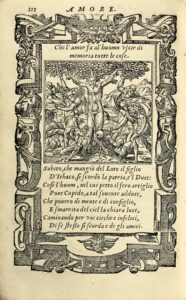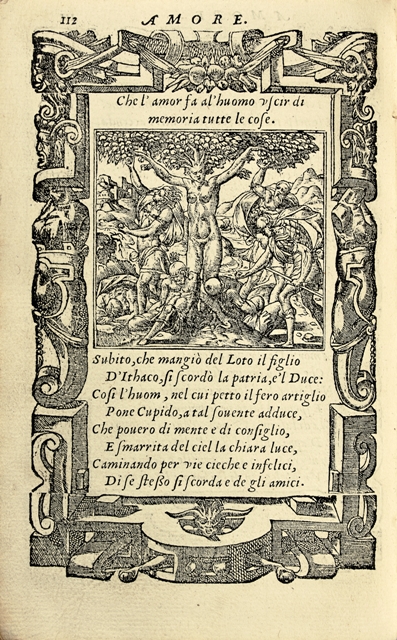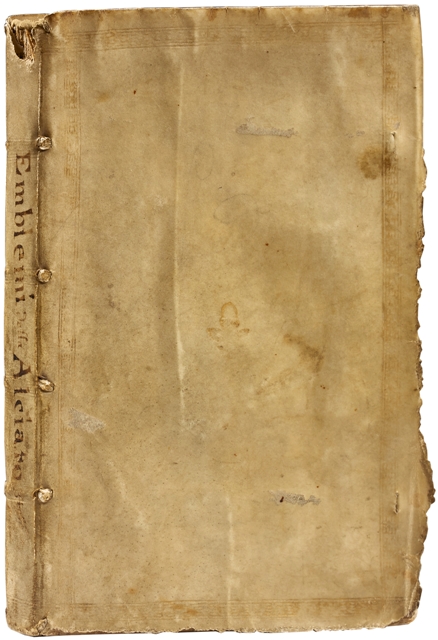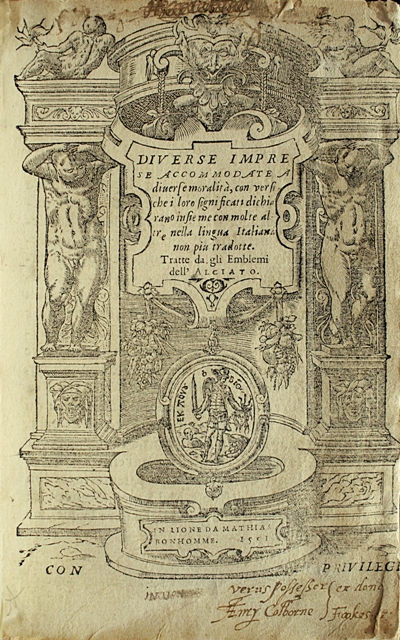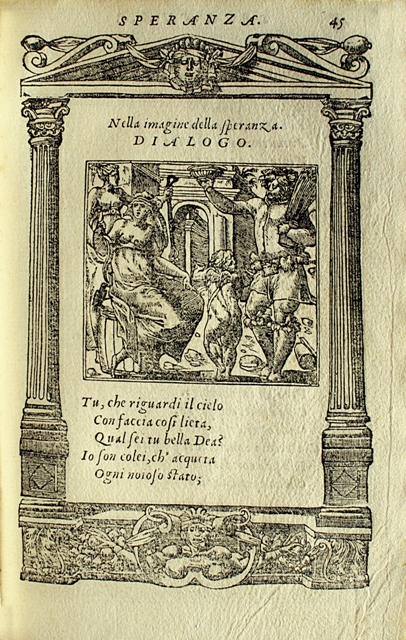Lyon, Mathias Bonhomme, 1551.
8vo [182 x 114 mm] of 191 pp. including 169 emblems and 11 engravings of trees. Several ex-libris on the title leaf, small tear in the outer margin of p.3 slightly affecting the frame of the engraving. Contemporary limp vellum, gilt border on the covers, flat spine with the handwritten title. Contemporary binding.
A rare edition of this illustrated book of emblems that was extremely successful all along the 16th century. Graesse, I, p.62; Baudrier, Bibliographie lyonnaise, IX, p. 187; Fairfax Murray, French, 10.
The emblems are here dedicated to Francesco Donato, doge of Venice, by Giovanni Marquale, the translator of the text.
André Alciato was born in Milan on May 8th, 1492. He went to study law in Pavia and Bologna. Appointed, in 1521, professor of law at the university of Avignon, he got in this city such great successes, that we counted up to eight hundred people in his audience; but the lack of accuracy put into paying his fees convinced him to go back to Milan. Alciato was one of the first to feel that studying history is indispensable not to make any mistake in the study of law, and that the culture of the arts isn’t less necessary to the study of case law. “He had to take refuge in France, in 1529, where Francis I, taking advantage of the blind furor of Alciato’s compatriots, fixed him in his Estates thanks to his benefits, and gave him the chair of Bourges, with a pension of 600 écus, which doubled the following year. Alciato was mean, and money was always a way to get to him. Francesco Sforza, duke of Milan, called for him, and, knowing his passion, threatened to confiscate his properties if he didn’t come back. Such a threat, with offers of gifts, considerable pensions, and with the dignity of senator, convinced Alciato to return in his homeland. He then came back to teach in Pavia; but soon went to the university of Bologna; four years later, he came to get back his chair in Pavia, and, after a while, let himself again get in Ferrare thanks to the gifts of the duke Hercule d’Est”.
His most famous work, the Emblems, are pieces of four, six, eight or twelve verses enclosing literary and moral thoughts.
The illustration is composed of 180 fine woodcuts (61 x 65 mm) evoking the style of Bernard Salomon, called the little Bernard; some bibliographers indeed attribute them to him. The drawings actually seem to have been executed by this Fribourg engraver Pierre Vase who arrived in Lyon towards 1548 and stayed there several years before going to Geneva. He developed the themes used by Bernard Salomon and added many very personal patterns.
Each of the 169 first figures is a very precise evocation of the explicit emblem in italic letters under the engraving. The 11 last ones, line-engraved, represent various trees essences.
The edition encloses much more engravings than the 1548 one, which only enclosed 127 woodcuts and than the 1549 one that comprised 165 figures.
Besides the title decorated with a portico held by two children, Pierre Vase has especially drawn for these emblems 35 different types of patterns, which, alternatively, frame in full-page each one of the 180 engravings. Arabesques, grotesques, architectural patterns, children and animals, landscapes, naves and sea monsters, flowers and fruits mingle in harmony in a Renaissance style evocation.
Beautiful and very pure copy, of one of the most famous illustrated books of the Renaissance, preserved in its first contemporary limp vellum binding.
Provenance: Henry Colborne, ex dono Fookes (inscription in ink at the bottom of the title l. and at the verso of the last l.)
